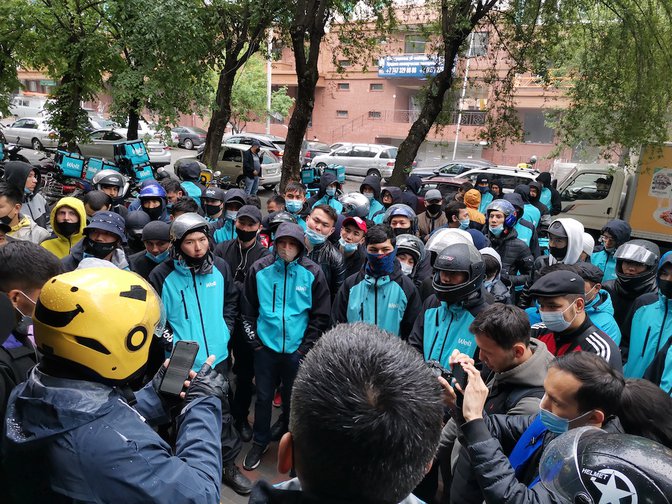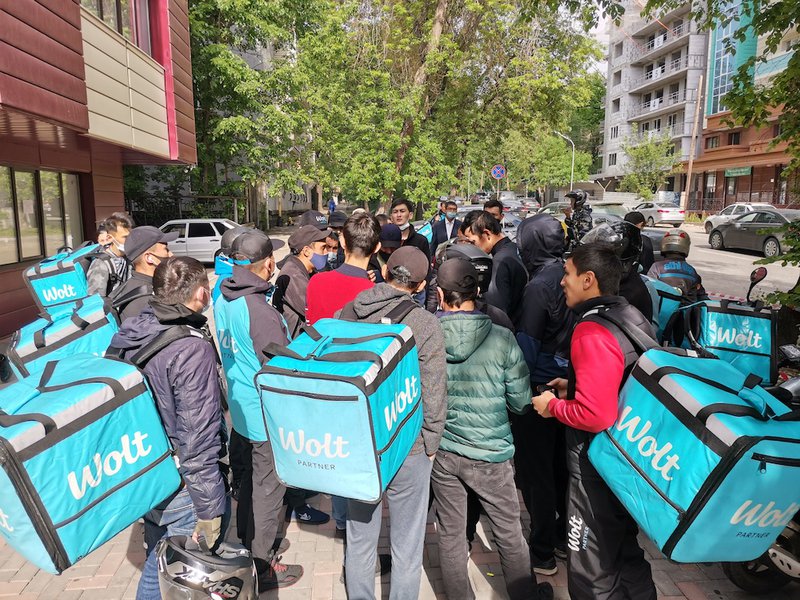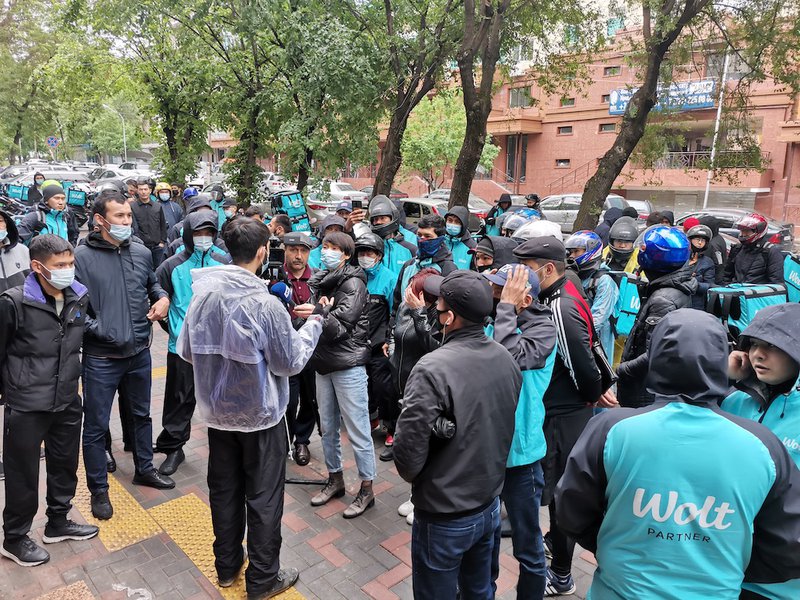Workers pushed into unstable jobs by the pandemic are fighting against repressive local rules to set up their own trade union
Dmitriy Mazorenko is the editor of Kazakhstan independent online media Vlast.kz, and researches capitalism, social transformations, and mass culture
Cross-posted from Open Democracy

|Image: Dmitriy Mazorenko
t first glance, the men wearing sky blue vests and backpacks in the centre of Almaty city look like they’ve gathered for a patriotic rally – they’re wearing Kazakhstan’s official colours, after all.
But after looking a little closer, it’s clear that the shade of blue is actually the same as that used by Wolt, a Finnish food delivery company that is at the centre of a pushback against the gig economy in the Central Asian state.
In mid-May, a crowd of 100 Wolt couriers assembled outside the company’s main office to demand a review of a new policy that slashed their commissions.
A week earlier, during a long weekend celebrating the Soviet victory in the Second World War, Wolt couriers delivering food around the city saw their pay reduced by 30-50% for each ride. After comparing notes, they realised that management had changed the remuneration policy. In response, they organised a strike – one of the largest actions by non-unionised workers in Kazakhstan in the past decade, outside of the extractive sector.
“Everyday life becomes more expensive, yet our employers have the guts to cut our wages or fire us without a hesitation. What is left for us to do? We are all very nervous, and that’s why we had to go on strike,” one courier told openDemocracy, on the condition of anonymity.
During the strike, Wolt’s local management blamed the religious month of Ramadan as the reason for the lower number of deliveries, and therefore lower income.
Wolt Kazakhstan general manager Alibek Yesov said: “The company re-examined compensation for deliveries. And they made it profitable for couriers to take short deliveries, as well as long ones. We made a mistake when communicating this.”
The following day, however, Wolt said it had tweaked the payment algorithm to put in place a new reward system that made short deliveries as profitable as long-distance ones. Only weeks after the strike, the company added: “Previously, the fees for short- and long-distance orders differed by more than 2.5 times. With the new reward payment system, it has been reduced to two times. Even after the changes, couriers will continue to receive fair pay.”

Repressive environment
Wolt is one of several players in the food delivery market in Kazakhstan and its workers, together with other platform workers, are now pushing to form the first couriers’ union in the country – fighting back against high unemployment amid the pandemic and a repressive environment for independent labour organisations.
Wolt, which is active in more than 20 countries across Europe, the Middle East and Asia, entered the Kazakhstani market in 2019. In January this year, the company raised $530 million from venture capital investors. Like several of its competitors in Kazakhstan and elsewhere, the company offers delivery work on commission, with remuneration linked to the number of deliveries that couriers carry out.
While pandemic restrictions on the operation of restaurants and cafes have hit Kazakhstan’s hospitality industry, the gig economy has thrived, and this sector has continued to grow throughout the pandemic.
Last year, delivery revenues reached $101 million, 2.5 times higher than previous years. Last year, Wolt’s estimated revenue was $23 million, while its competitor Glovo brought in $4.3 million, according to calculations based on data from the Ministry of Finance. Another delivery company, Chocofood, held the lion’s share of the Kazakh market until 2019, but since then has faced increasing competition.
But throughout this year and last, it’s become clear for people working at digital employers that their working conditions have often worsened as a result of the pandemic. Worsening conditions for workers in the gig economy is not specific to Kazakhstan or a consequence of the Soviet past or authoritarian present. From the UK to Ukraine and beyond, the gig economy is a global phenomenon that benefits irresponsible employers rather than workers.
At the end of January, Glovo couriers in the Georgian capital of Tbilisi stopped delivering in a widespread protest against worsening work conditions. Before that, in August 2019, Glovo’s yellow backpacks were put down in Ukraine’s capital, Kyiv, as workers took a stand against a sizeable pay cut. In the UK, riders for Deliveroo organised a wave of protests in April when the company started trading on the London Stock Exchange.
Kazakhstan, like many countries globally, has suffered economically during the pandemic. The country’s GDP shrank by 2.6% last year, the worst annual result in 20 years. Unemployment increased by eight times to levels not seen for 20 years, as company revenues declined.
In these conditions, Wolt was not the only delivery company trying to squeeze the most out of its couriers. In May, Chocofood also faced resistance from its couriers about pay.
In a statement, Chocofood CEO, Ramil Mukhoryapov, said: “We changed our bonus system months ago. Now we don’t have any reason to reconsider it. Those who don’t like the conditions of our company can find another job.” However, a swift negotiation allowed both sides to reach an agreement before a strike.
According to drivers working for delivery companies, including Wolt, they mostly sign civil contracts, which do not cover social security.
Delivery platforms call this system a ‘partnership’, which turns couriers into entrepreneurs: they take home as much revenue as they can deliver on any given day and then pay taxes, pension contributions and more out of their earnings, depending on the specifics of each country.
Odds stacked against couriers
In Kazakhstan, however, the law requires the delivery platforms to pay couriers’ income tax and other contributions, which reduces the take home pay. The solution, according to one driver who works for three different delivery platforms, is to register as an independent contractor, because that way the tax burden is lower.
“They pay taxes out of the employee’s pay cheque but at the same time do not bear any social responsibility for us,” said Yerzhan*, a driver. “Around 22% of employee salaries are deducted as income tax, pension contributions and health insurance. That’s why some of us prefer to register ourselves as individual contractors. We received state incentives during the pandemic and have to pay less tax.”

The pay rate varies between companies, from the lowest at Chocofood and Yandex.Food ($1.50 per delivery) to Wolt ($3.50 per delivery). Some companies compensate for low rates by giving out bonuses, which are linked to extra work. At Chocofood, for instance, couriers need to make a delivery within ten minutes to receive a bonus.
The specifics of the algorithms stack the odds against couriers, as the navigation tools and road conditions affect delivery times. The race to clear all the bonus hurdles puts a physical strain on couriers’ health. In case of illness or injury, however, they have to pay for their own medical bills and lose income because the companies don’t provide sick pay.
Couriers may face unstable payment levels but often have high monthly payments that must be met. Loans and mortgages that were taken out long before the onslaught of the pandemic, when most couriers had access to a diverse range of jobs, continue to be a monthly burden for those who had to turn to the gig economy to escape unemployment.
“Just like most others, I also owe money to the bank,” said Azamat*, a Glovo courier. “We all took out loans to pay for our cars and bikes [used for delivery work], so we work like robots from dawn to dusk to pay back our debts.”
Kazakhstan’s economic downturn has also fuelled an internal migration from rural areas and smaller cities to larger metropolises such as Almaty and the capital, Nur-Sultan. A brief survey of couriers gathered at the Wolt headquarters in May revealed that most of them also face the instability of rental accommodation.
But against a backdrop of precarity, couriers at Chocofood were told to “deal with it or find a better job”, as the CEO put it.
“The problem is that there is no ‘other job’. Many of us are here because we were let go from our previous employers,” Almaz*, a Wolt courier who previously worked as a university researcher, told openDemocracy.
Seasonal or commission-based work has led to a massive drive towards self-employment, as traditional companies slash their workforce and platform companies reward those who can fulfill their needs on the spot. In Kazakhstan last year, the share of self-employed people made up more than 20% of the workforce.
Couriers from various platforms are in the process of finalising their new trade union charter. Zhenis Orynaliyev, chair of the would-be union, said that at least 200 couriers from different companies were ready to join him.
“We need to push companies to consider us as employees and pay our taxes and contributions, as well as our medical expenses,” he said. “We need legal protection and compensation in case of accidents.”
Seeking security
Orynaliyev and five other co-founders of the union are now hoping to open a space where drivers can meet and rest. For the union to be officially registered, however, Kazakhstan’s Law on Trade Unions requires at least ten people to be part of the founding committee. Although amended in late last year, the law continues to impose stringent limits on freedom of association in the country.
For their actions, couriers now expect resistance. Earlier this month, Wolt announced changes in the payment rates for new workers. Couriers said the measure could be used as a way for the company to substitute them with new couriers at lower rates.
Longtime couriers of Wolt, in conversation with the author, noticed that the company was blocking them more often in the system. While they have no access to the way Wolt assigns rides, they suspect that the company is using this method to push away experienced couriers who earn higher wages, in order to make room for new drivers who will receive less.
When asked about their algorithm, Wolt replied that blockings of couriers have not increased since the review of fees.
“After we changed the rates for new couriers, their earnings will be changed [reduced] by 10-15%, yet cases of blocking did not increase. In the event that a courier is blocked, they receive timely feedback with an email explanation of the reasons for blocking,” a Wolt spokesperson told openDemocracy via email.
Yet, in the aftermath of the three-day strike, Wolt banned around 40 couriers from its system for taking part, strike organisers said. However, after intervention by local authorities, the ban was removed. “Our protests hit the company’s reputation, that’s why they suspended us,” one courier told openDemocracy on the condition of anonymity.
Workers hoping to find security by setting up unions also face resistance from local authorities; Kazakhstan’s officials have historically repressed trade union leaders.
“Today it is extremely difficult for workers to register independent trade unions and effectively carry out their activities. It is critical that neither the companies that employ couriers, nor the Kazakh authorities, interfere in these efforts, and allow the couriers to organise without harassment or retaliation,” Mihra Rittman, senior Central Asia researcher at Human Rights Watch, told openDemocracy.
BRAVE NEW EUROPE is a not-for-profit educational platform for economics, politics, and climate change that brings authors at the cutting edge of progressive thought together with activists and others with articles like this. If you would like to support our work and want to see more writing free of state or corporate media bias and free of charge, please donate here.


Be the first to comment